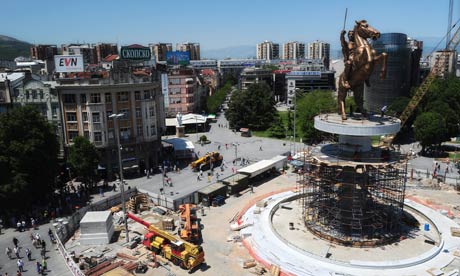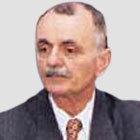(Slavo)Macedonia's monument to discord
Today's Zaman
A note on the article (MEB): Hajrudin Somun has a thing or two confused about ancient history. While he is obviously trying to be objective, and he is, he seems to have mixed up the Bulgarian speaking Slavomacedonians with Philip's Greek speaking ancient Macedonians. Obviously he is correct when he says: "There is no doubt that Alexander was a great historical Hellenic figure, but that does not mean that everything that was Hellenic belongs to modern Greece."
A statue of Alexander the Great in Skopje has irritated Greece and reignited the debate about the naming of Macedonia

The statue of Alexander the Great stands in Macedonia Square, in the centre of Skopje. Photograph: Georgi Licovski/EPA
There was a cultural event in Skopje that would not for a moment draw the world's attention from much more important events – such as the uprisings in Syria and Libya, for example – if it did not have such an intense political background, connotation and reaction. A giant statue of an ancient warrior on a horse was erected in the main square of the Macedonian capital on 21 June. It was greeted with an ecstatic welcome from thousands of Macedonians present at the square and caused a great deal of anger in neighbouring Greece.
There was another attraction in the event as well; nobody officially said who the huge equestrian statue represented and in other circumstances it might be one of those "unknown soldiers" that many countries have dedicated national monuments to. In this case, however, the image and appearance of a warrior cast in bronze was well known to everybody, and it was easily recognised as the figure of Alexander the Great, whom both Macedonians and Greeks consider their primeval ancestor.
There is no doubt that Alexander was a great historical Hellenic figure, but that does not mean that everything that was Hellenic belongs to modern Greece. What might be said for numerous historical sites in Anatolia and the Middle East that belonged to the promising Hellenic centuries? Greeks long ago gave up the "Hellenism" of those areas and now go to these destinations as tourists, proud they were once part of that common civilisation. The cause of Alexander and Macedonia is, of course, different and it was created in modern times when Ottoman treatment of the Balkan ethnicities was altered by the rise of local nationalism and conflict, even wars among themselves.
Thus, the identification of Alexander the Great as more or less Greek or Macedonian is an invention of the modern nationalistic movements. Alexander was the son of Philip II the Macedonian, but he himself could not be regarded as being just Macedonian or Greek. He belongs to both contemporary Greece and Macedonia, by way of his Hellenic blood or by his Macedonian land and ancestors. He belongs perhaps even more to the whole world, despite being regarded as a bearer and messenger of Hellenic civilisation, or a cruel invader and destroyer of more ancient ones. It is not important that I personally believe the latter and that the west's prevailing negative view of the old eastern peoples and cultures was created by biased and prejudiced ancient Greek historians.
At this very moment it is important that modern Macedonia had the right to raise a monument to Alexander the Great if it were done on a more modest scale, in a less striking place in their capital, at a less challenging time and – what is perhaps even more important – if it were not done in reaction to the persistent two-decade-long Greek refusal to recognise the name of the Republic of Macedonia, which the parliament of that country adopted and two thirds of the UN member-states accepted.
However, due to Greece's rejection of the name and right to veto in the European Union, Macedonia – in all international organisations and official events, even sports-related ones – still bears a long and strange name: "the Former Yugoslav Republic of Macedonia" (FYROM), which was adopted as a precondition for the country's recognition and acceptance to the UN. It is ironic that Yugoslavia has disappeared from the Balkan map, but its name still appears in the name of a country that, similar to other former Yugoslav republics or any other country in the world, deserves the right to name itself by the will of its people. In spite of UN-led negotiations, the two countries have not been able to solve the name dispute. Greece hardly accepts Macedonia having the same name as its northern province.
In Athens, the Republic of Macedonia is usually called Skopje, its capital, while it is officially referred to as FYROM. For the same reason the Greek government doesn't recognise the Macedonian constitution and flag, which bears a symbolic Hellenic sun. For the Macedonian people and language, Greeks use the adjective "Slavomacedonian" because they consider any use of the pure Macedonian term as a theft of their identity and a "falsification" of their history. That is why Greeks consider Alexander the Great theirs and see the unveiling of the statue in Skopje as a direct insult "with the aim of stirring up nationalism and conflict". This has only re-confirmed the Greek foreign ministry's official explanation of the dispute, which says FYROM "is exercising a policy of irredentism and territorial claims fuelled by the falsification of history".
The erection of the 13-metre Warrior on a Horse statue might be a mark of the Macedonian prime minister Nikola Gruevski's victory after the early elections held at the beginning of June. Known for his uncompromising approach towards the name dispute with Greece, he did something similar after his party won elections five years ago, naming the Skopje airport after Alexander the Great, as well. That also irritated Greece.
Gruevski's party – whose name is as complicated as the country's name, the Democratic party for Macedonian National Unity – Internal Macedonian Revolutionary Organisation (VMRO-DPMNE) – has roots in the 1893 Macedonian patriotic revolutionaries' movement, whose sole aim was "liberating the Macedonian people from the Ottoman yoke". It is today a Christian Democrat and anti-communist party, ethnically based and claiming that "the party's goal and objectives express the tradition of the Macedonian people". It won 37% of a total 1.1 million votes.
The main opposition Social Democrats (SDSM) followed Gruevski's party with 33% of the vote. They are led by former president Branko Crvenkovski, who split earlier with Gruevski, solely on the issue of the country's name dispute. Crvenkovski followed the more conciliatory line of the first president of the independent Macedonia and former chairman of the Yugoslav socialist parliament, Kiro Gligorov, who said: "We are Slavs who came to this area in the sixth century, and we are not descendents of the ancient Macedonians."
After Greeks have in principle accepted the term Macedonian, it might be included in the country's name. Both Greek and Macedonian centre-left parties were ready to accept some proposals by the UN mediators, such as "New Macedonia" or "North Macedonia", but the leading centre-right politicians remained adamant in their extremist positions. Greeks are still repeating the old slogan: "No EU and Nato membership for Skopje unless they change their name."
If he did not place a huge monument to Alexander the Great in the centre of Skopje, I would be able to understand Prime Minister Gruevski's persistence regarding the name of his country. The name itself might perhaps be compromised if Greece stops using it as a reason to block Macedonia's bid to join the European Union and Nato, as that was the only reason it did not become a member of the Euro-Atlantic integrations. When all Nato member states except Greece agreed to offer Macedonia membership at the alliance's summit in Bucharest in 1998, and the US applied additional pressure in that regard, thereby recognising Macedonia by its constitutional name, the invitation was called off at the last moment.
This is happening again this year, and who knows for how long. I do not know if there is any prime minister who would not be furious sitting at the United Nations, or other international body, without the constitutional name of his own country in front of him. Due to Greek opposition, a ridiculous solution was found in the UN headquarters, as Greeks not only objected to Macedonians sitting behind the letter M, but also being behind the F (of FYROM), because it would be too close to Greece's G. So, the world organisation, most of whose members recognise the country by its constitutional name, assigned Macedonia's chair after Thailand, by the letter T, because of its provisional name, "The Former Yugoslav Republic of Macedonia".
It is thus possible that the Macedonian prime minister is using Alexander the Great as a tool to gain support for his party with a nationalistic background, diverting people's attention from the bleak economic situation in a country with a current unemployment rate of at least 30%. One could also easily agree with London's The Economist which said that unveiling the Alexander statue in Skopje might give George Papandreou's government in Athens a chance to divert attention from the catastrophic financial situation in his country, but I would hardly agree with the esteemed magazine's conclusion that "everyone else will assume this is just more Balkan-flavoured craziness". It is a well-known story about the Balkans that it is as a "barrel of gunpowder". Wouldn't it also be "craziness" to use an old-fashioned veto to block access to the UN and Nato for a country that has fulfilled all conditions except its name, which its people and representatives have chosen and most of the world countries have accepted?
Although it is another subject to be reviewed on another occasion, there is also reason to question whether the name dispute between Macedonia and Greece is part of the ongoing different approach and even different strategy of the US and leading EU member states toward Balkan issues, which we in Bosnia and Herzegovina are witnessing these days as well.

Δεν υπάρχουν σχόλια:
Δημοσίευση σχολίου